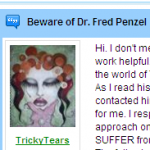Support critical for healing trichotillomania
We’re writing this blog in response to a comment made on Daily Strength, in a trichotillomania support group designed to help people stop pulling hair out.
The post was made in response to a paragraph written by Dr. Fred Penzel in his book “The Hair Pulling Problem.”
The author of the comment, Tricky Tears, complimented Dr. Penzel for all the research he’d done on trichotillomania, but took issue with a paragraph in the book. Her comment made us think about our approach at StopPullingHairOut.com.
“Tough love”, or lack of support?
Let’s start by delving into the excerpt in question. Dr. Penzel writes, “You need to accept that TTM will not simply go away by itself. You will not wake up one morning and find that it has gone. While some people have experienced remissions, it would not be a good idea to count on this happening for you. If you believe that this is unfair, or the fact that you have it at all is unfair, I would advise you to reconsider. It is not unfair that you have it. We cannot say that life is fair or unfair. The world has not been set up according to a set of rules for us that we can point to and say they were not being followed. It simply is what it is.”
Tricky Tears did not appreciate the doctor’s tone. She writes: “I think this is the most deplorable thing anyone, especially a doctor, can say to someone who is suffering from not just TTM, but any condition or illness. I KNOW that I can’t change my genetic makeup. He didn’t have to explain that to me. But one thing I CAN change (with a lot of hard work and persistence) is my behavior. I absolutely disagree with his statement that remissions aren’t possible for all TTM sufferers. I’ve been there. I stopped pulling for a very long time. I think this statement is irresponsible and counterproductive, offering very little or no hope for those who feel the shroud of darkness enveloping their very essences. If Dr. Penzel had any type of impulse control disorder, he would know just how much reading this statement could discourage someone who suffers from one.
Suffice it to say, I have not read past page 51.”
From an outsider’s perspective, there may be merits to both points of view. One interpretation of Dr. Penzel’s statement may be that he doesn’t want people to be in denial of the trichotillomania condition: He doesn’t want you to believe it will simply go away without some sort of action.
However, if that was his point, his next statement, “While some people have experienced remissions, it would not be a good idea to count on this happening for you” should have included a qualifier, such as: “While some people have experienced remissions, it would not be a good idea to count on this happening for you without treatment.”
Perhaps the biggest problem with Dr. Penzel’s writing is the tone, and perhaps that’s what Tricky Tears objects to most of all. Her statement really sums it up: “If Dr. Penzel had any type of impulse control disorder, he would know just how much reading this statement could discourage someone who suffers from one.”
How do we strike the right tone to help people stop pulling hair out?
My name is Greg Mischio, and I handle the outreach effort for Dr. Chad’s efforts to reach out to people with StopPullingHairOut.com. Neither Dr. Chad nor I suffer from trichotillomania, but we both understand and empathize with the human condition of not being able to change due to a compulsive disorder.
Dr. Chad has helped countless people recover from obsessive compulsive disorders. He has seen some dramatic improvement in the clients with trichotillomania he’s helped, which is why we’ve begun this initiative.
My son experiences obsessive compulsive tendencies, and it’s been something our family has struggled to deal with. I’ve seen firsthand how difficult it can be for my son to stop touching things, which I know is on the spectrum of trichotillomania.
As we’ve been writing blog posts like this, and putting together our website, we’ve talked endlessly about the tone of our posts and our website. We want people to consider using our treatment, because we’ve seen great improvements in people who’ve used Dr. Chad’s approach.
But we don’t want to alienate people who suffer from trichotillomania by coming across as being too “salesy” with our approach.
For example, we’ve named our site “StopPullingHairOut.com” because we know that’s the best way to get website traffic for that keyword, and reach out to you. But is that offensive? Do you mistrust us for it?
What do you think about Stop Pulling Hair Out?
We’d be interested in hearing your reaction not only to Tricky Tears comment, but also to our approach. What do you think about us? What about our tone? What do you think about Dr. Chad’s strategy for helping people resist the urge to pull?
Please leave a comment and let us know. It will help us find out if there are ways we can provide the hope that Tricky Tears is looking for, and the encouragement to take action that Dr. Penzel may be urging as well.


